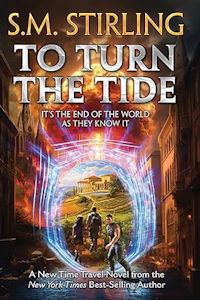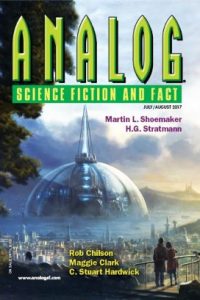Paul Di Filippo Reviews To Turn the Tide by S. M. Stirling
 To Turn the Tide, S. M. Stirling (Baen 978-1982193539, hardcover, 464pp, $28.00) August 2024
To Turn the Tide, S. M. Stirling (Baen 978-1982193539, hardcover, 464pp, $28.00) August 2024
Time travel novels—recently, a trendy favorite of non-genre slipstream authors—have reached a state of incredible complexity. Multiverses, paradoxes, change wars, closed loops, and doppelgangers proliferate. This is all very entertaining, but sometimes it’s nice to read a simple, straightforward “person visits past, gets stuck, makes do” kind of book. A chrono-Robinsonade. That’s exactly what S. M. Stirling gives us with To Turn the Tide, the first in a series to be titled To Make the Darkness Light. (But no worries about narrative closure with this initial volume, for the ending is highly satisfying.) But as is Stirling’s wont, this old-school story is ramped up to eleven, utterly state of the art. Nothing retreaded, everything freshly conceived and conveyed. Everything old is new again. Get ready for a wild ride that is at once resonant with the classics of this subgenre, yet totally in conversation with 2024.
In the first eight pages of Chapter One, Stirling accomplishes what other writers might stretch out over the first quarter of their book. We meet our five heroes and get a nice précis of their characters. Our main protagonist is one Arthur Vandenburg, an ex-soldier, now possessing a doctorate in ancient history, and thus a man of some years. Along with him come four youngish grad students, also history buffs, though possessing other skills. Filipa Chang, Mark Findlemann, Paula Atkins, and Jeremey McCladden. They have just arrived in Austria, at a research facility outside Vienna, at the behest of Professor Fuchs, who apparently needs their talents for his project.
However, the global situation at this near-future date is dire. Every nuclear state is almost on the point of launching their missiles. This job interview is going to be conducted with half an ear, as everyone tries to listen to doomsday broadcasts.
Just as Professor Fuchs is about to demonstrate his invention—a time travel platform already loaded with cargo—the missiles fall. There is just enough time for Fuchs to activate the gate, whereupon he and the five Americans plunge through, cargo too, just as the whole planet is vaporized by thousands of nukes.
Cut to a wandering Jewish merchant named Josephus ben Matthias, who is present in the province of Pannonia Superior (aka, modern Austria) on business, during the year 165 (arguably the height of the Roman Empire). Imagine his surprise to find five dazed strangers and one corpse (Professor Fuchs, alas) with all their gear and boxes lying inexplicably in the middle of a field with no sign of tracks or carts.
The time-travelers regain their senses, accept and understand their fate, They investigate the extensive provisions Fuchs had prepared, and intuit his scheme: to save the Roman Empire from its imminent historical collapse.
Luckily, Josephus is a smart and rational fellow, and, with a few doubts, accepts the cover story that Arthur provides. The presence of many jewels and coins has no small influence on this businessman.
And now the world-saving, history-changing mission can begin.
Veteran readers will certainly recognize the broad outlines of this scheme as the plot of de Camp’s Lest Darkness Fall. The thing is, Arthur and his SF-savvy students explicitly acknowledge this precedent too, thereby defusing any assumptions that this tale will be a mere replay. It’s a different Roman era from that of the de Camp book, and Arthur has plans that are more far-ranging that those of de Camp’s hero, Martin Padway.
So far, I have summarized about twenty pages out of nearly five hundred. What follows is masterful exfoliation of these plans, rich with granular detail, domestic and otherwise. Stirling’s researches must have been tremendous, and the distillation of all this history and the technological innovations is delivered seamlessly with the action sequences and the personal arcs of the characters. Arthur and his small Round Table of grad students have to work their tails off—which does not preclude romance, pratfalls, shocks and arguments, and bouts of drunken grief over the fate of their former world. Stirling’s technique of inserting sizable italicized chunks of the stream of consciousness of each character puts us vividly into their shoes. They emerge not as all-wise visitors from the future, but humble and fallible would-be saviors.
As for the natives, the key ones emerge brightly also. Josephus becomes an integral and wise part of the master plan, and his bodyguard, an Amazonian warrior named Sarukê, plays a huge role, even forming a lover’s bond with one of the Americans. As for historically verifiable personages, the two main ones are Emperor Marcus Aurelius and his physician Galen. Both men are eventually privy to the secret origin of the time-travelers, and exhibit as much sophistication as anyone could.
Besides introducing many domestic goodies, starting with the unheard-of notion of a wheelbarrow!—Arthur has to improve the arts of war, to stave off the Marcomannic invasion. Will a few gunpowder bombs do the trick? Beautifully staged, realistic and thrilling battle scenes, full of true threats to our heroes, ensue. Only reading To Turn the Tide will reveal their ultimate success or failure.
The events of this thick book span a mere two years, but the action does not seem draggy. I am unsure if future books in the series will encompass a similar span. A ten-volume series would only cover twenty years of Arthur’s accomplishments. I expect Stirling will perhaps accelerate his pace, in order to show the outcome of history’s deviations.
At one point, Arthur opines to the Emperor: “Knowledge accumulates over the years. And past a certain point, if certain discoveries are made, knowledge breeds knowledge faster and faster. But knowledge is not the same as wisdom…”
To Turn the Tide is the perfect fusion of knowledge and wisdom—with the seasonings of commitment and slaughter as spice.
 While you are here, please take a moment to support Locus with a one-time or recurring donation. We rely on reader donations to keep the magazine and site going, and would like to keep the site paywall free, but WE NEED YOUR FINANCIAL SUPPORT to continue quality coverage of the science fiction and fantasy field.
While you are here, please take a moment to support Locus with a one-time or recurring donation. We rely on reader donations to keep the magazine and site going, and would like to keep the site paywall free, but WE NEED YOUR FINANCIAL SUPPORT to continue quality coverage of the science fiction and fantasy field.
©Locus Magazine. Copyrighted material may not be republished without permission of LSFF.








I think this is a brilliant review… mind you, I’m a bit biased… 8-).